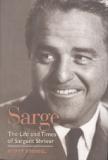The Man's Full Measure
Scott Stossel’s uplifting biography of R. Sargent Shriver deserves a prominent place on the reading lists of Catholic studies programs. It is an inspiring and skillfully told story of a bright American hero whose public-minded outlook and optimism finds its source in his Catholic faith.
Stossel, a senior editor at The Atlantic Monthly, introduces us to Shriver in a fresh way. We get to know him not so much as a Kennedy in-law but as an independent force for social reform, who by sheer force of his energetic personality and inherent goodness gave rise to some of the country’s most admired social initiatives.
Sarge is Scott Stossel’s first foray into the world of political biographies. It will be our good fortune if he stays with this genre in the future. In his inaugural work, Stossel combines a reporter’s eye for detail, a storyteller’s sense of drama and a scholar’s consciousness of history.
Stossel’s work is a reminder of just how far the nation has slid from the peaks of bipartisanship that governed Washington in the Kennedy and Johnson administrations. For many too young to remember, congressional cooperation is the stuff of dreams; Stossel’s book reminds us that it can be otherwise.
Today’s divided Congress is much different from that in the Kennedy/Johnson era, when lawmakers worked together to authorize untested initiatives like the Peace Corps and experiments to root out rural and urban poverty. But even in a time of greater national accord, these were feats largely attributable to the drive and imagination of one person, R. Sargent Shriver. His biographer sweeps the reader up into the electrified environment in which Shriver worked his magic, leaving one applauding both the hero and the unique way his story is told. Unlike many biographies that treat the same era, Stossel’s story shows how religion and character were powerful and providential factors influencing events in this unique period of our history.
While most of the book focuses on Shriver’s life and role during the Kennedy and Johnson years, Stossel also offers us a rich look into the childhood and early years of this great American. We learn of the Shriver family roots in early Maryland and of his family’s decades-long friendship with Baltimore’s legendary Cardinal James Gibbons (1834-1921), perhaps the most visionary and ecumenical leader in American Catholicism. Gibbons was a frequent guest at Union Mills, the Shrivers’ homestead, and a seminary classmate of Shriver’s father.
Shriver’s extensive student travels abroad through the Experiment in International Living had a powerful formative effect on him. His trips around prewar Europe exposed him to a view of the world that would later influence his thinking on international cooperation.
Shriver’s Catholic faith helped shape his early interest in social reform. As a university student, Shriver was captivated by the Catholic Worker Movement and brought Dorothy Day to Yale. His participation in Chicago’s Catholic Interracial Council provided a providential link to J.F.K.’s introduction to Coretta Scott King and J.F.K.’s historic phone call to Mrs. King that brought the emergent civil rights movement critically important White House support.
Yet the book is not a parochial history. Much of it focuses on Shriver at major moments in the Kennedy and Johnson presidencies. Both J.F.K. and L.B.J. were good at promising bold initiatives, but it was Shriver who brought much presidential oratory to life. He masterminded the creation of the Peace Corps and major elements of the domestic poverty program, simultaneously directing both. He was a whirling dervish of charm and salesmanship, and his can-do attitude pulverized Washington skeptics. Many underestimated Shriver. His optimism was often mistaken for a lack of intellectual depth. But his relentless energy and his amazing ability to inspire others enabled him to draw together an army of brilliant young talent to export peace and alleviate poverty.
Sarge does not gloss over the difficulties and tensions Shriver faced within Kennedy circles. Shriver’s independent mind-set on political matters engendered hostility and even bitterness among Kennedy family political advisors. Few of them were there for Shriver when he mounted his ill-fated runs for elected office. Shriver’s optimism and good humor prevailed. Political losses rarely affected family relations or his productive partnership with his wife, Eunice.
One shortcoming of the book is Stossel’s belaboring of Shriver’s unshakable in-law image. Stossel gives too much weight to this narrow perception, given the lasting contributions R. Sargent Shriver has made by virtue of his brilliance, goodness, humor and plain hard work. Also, I would have liked to read more about the Shriver marriage. The author’s inattention to this area is a curious drawback of an otherwise absorbing biography. Not only did the Shriver marriage produce a generation of accomplished and public-minded offspring, but a wide array of new resources for the nation owe their beginnings to the Shriver enterprise. The Head Start program was born of Eunice’s reading and research into learning by disabled children. Husband and wife were behind the creation of the Kennedy Center for Bioethics at Georgetown University. The International Special Olympics programnow an internationally renowned sports program for the disabledwas another joint venture of this illustrious couple. Instead, Stossel provides only fleeting glimpses of Eunice and leaves the reader wanting to know more about the powerful synergism of their relationship.
Perhaps this suggests a sequel for Stossel: a biography of Eunice. She not only revolutionized the way the country dealt with the mentally retarded, but was the most public-minded of all the Kennedys.
R. Sargent Shriver, even now as he copes with advanced age and Alzheimer’s disease, is remembered not as half a Kennedy, but as a man for his times whose morally important achievements to advance peace and justice redefined and elevated public service, and left a nation and his church grateful indeed.
This article also appeared in print, under the headline “The Man's Full Measure,” in the September 27, 2004, issue.








